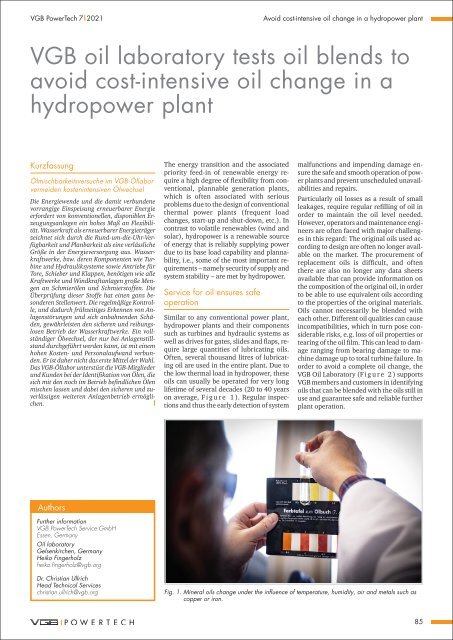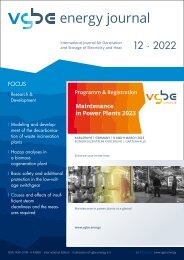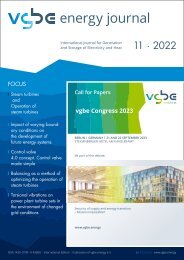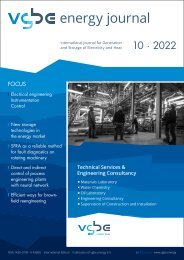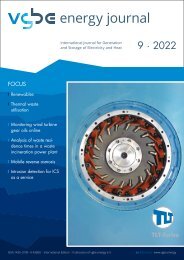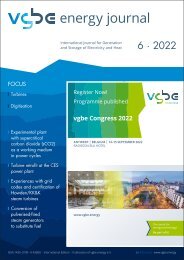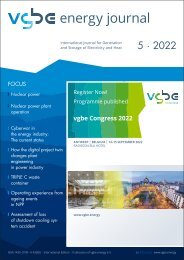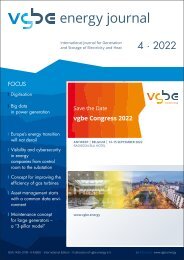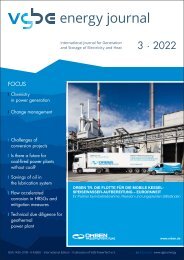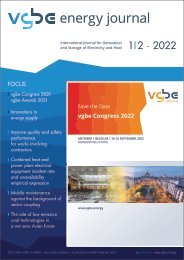VGB POWERTECH 7 (2021) - International Journal for Generation and Storage of Electricity and Heat
VGB PowerTech - International Journal for Generation and Storage of Electricity and Heat. Issue 7 (2021). Technical Journal of the VGB PowerTech Association. Energy is us! Optimisation of power plants. Thermal waste utilisation.
VGB PowerTech - International Journal for Generation and Storage of Electricity and Heat. Issue 7 (2021).
Technical Journal of the VGB PowerTech Association. Energy is us!
Optimisation of power plants. Thermal waste utilisation.
- No tags were found...
You also want an ePaper? Increase the reach of your titles
YUMPU automatically turns print PDFs into web optimized ePapers that Google loves.
<strong>VGB</strong> PowerTech 7 l <strong>2021</strong><br />
Avoid cost-intensive oil change in a hydropower plant<br />
<strong>VGB</strong> oil laboratory tests oil blends to<br />
avoid cost-intensive oil change in a<br />
hydropower plant<br />
Kurzfassung<br />
Ölmischbarkeitsversuche im <strong>VGB</strong>-Öllabor<br />
vermeiden kostenintensiven Ölwechsel<br />
Die Energiewende und die damit verbundene<br />
vorrangige Einspeisung erneuerbarer Energie<br />
er<strong>for</strong>dert von konventionellen, disponiblen Erzeugungsanlagen<br />
ein hohes Maß an Flexibilität.<br />
Wasserkraft als erneuerbarer Energieträger<br />
zeichnet sich durch die Rund-um-die-Uhr-Verfügbarkeit<br />
und Planbarkeit als eine verlässliche<br />
Größe in der Energieversorgung aus. Wasserkraftwerke,<br />
bzw. deren Komponenten wie Turbine<br />
und Hydrauliksysteme sowie Antriebe für<br />
Tore, Schieber und Klappen, benötigen wie alle<br />
Kraftwerke und Windkraftanlagen große Mengen<br />
an Schmierölen und Schmierst<strong>of</strong>fen. Die<br />
Überprüfung dieser St<strong>of</strong>fe hat einen ganz besonderen<br />
Stellenwert. Die regelmäßige Kontrolle,<br />
und dadurch frühzeitiges Erkennen von Anlagenstörungen<br />
und sich anbahnenden Schäden,<br />
gewährleisten den sicheren und reibungslosen<br />
Betrieb der Wasserkraftwerke. Ein vollständiger<br />
Ölwechsel, der nur bei Anlagenstillst<strong>and</strong><br />
durchgeführt werden kann, ist mit einem<br />
hohen Kosten- und Personalaufw<strong>and</strong> verbunden.<br />
Er ist daher nicht das erste Mittel der Wahl.<br />
Das <strong>VGB</strong>-Öllabor unterstüzt die <strong>VGB</strong>-Mitglieder<br />
und Kunden bei der Identifikation von Ölen, die<br />
sich mit den noch im Betrieb befindlichen Ölen<br />
mischen lassen und dabei den sicheren und zuverlässigen<br />
weiteren Anlagenbetrieb ermöglichen.<br />
l<br />
The energy transition <strong>and</strong> the associated<br />
priority feed-in <strong>of</strong> renewable energy require<br />
a high degree <strong>of</strong> flexibility from conventional,<br />
plannable generation plants,<br />
which is <strong>of</strong>ten associated with serious<br />
problems due to the design <strong>of</strong> conventional<br />
thermal power plants (frequent load<br />
changes, start-up <strong>and</strong> shut-down, etc.). In<br />
contrast to volatile renewables (wind <strong>and</strong><br />
solar), hydropower is a renewable source<br />
<strong>of</strong> energy that is reliably supplying power<br />
due to its base load capability <strong>and</strong> plannability,<br />
i.e., some <strong>of</strong> the most important requirements<br />
– namely security <strong>of</strong> supply <strong>and</strong><br />
system stability – are met by hydropower.<br />
Service <strong>for</strong> oil ensures safe<br />
operation<br />
Similar to any conventional power plant,<br />
hydropower plants <strong>and</strong> their components<br />
such as turbines <strong>and</strong> hydraulic systems as<br />
well as drives <strong>for</strong> gates, slides <strong>and</strong> flaps, require<br />
large quantities <strong>of</strong> lubricating oils.<br />
Often, several thous<strong>and</strong> litres <strong>of</strong> lubricating<br />
oil are used in the entire plant. Due to<br />
the low thermal load in hydropower, these<br />
oils can usually be operated <strong>for</strong> very long<br />
lifetime <strong>of</strong> several decades (20 to 40 years<br />
on average, F i g u r e 1 ). Regular inspections<br />
<strong>and</strong> thus the early detection <strong>of</strong> system<br />
malfunctions <strong>and</strong> impending damage ensure<br />
the safe <strong>and</strong> smooth operation <strong>of</strong> power<br />
plants <strong>and</strong> prevent unscheduled unavailabilities<br />
<strong>and</strong> repairs.<br />
Particularly oil losses as a result <strong>of</strong> small<br />
leakages, require regular refilling <strong>of</strong> oil in<br />
order to maintain the oil level needed.<br />
However, operators <strong>and</strong> maintenance engineers<br />
are <strong>of</strong>ten faced with major challenges<br />
in this regard: The original oils used according<br />
to design are <strong>of</strong>ten no longer available<br />
on the market. The procurement <strong>of</strong><br />
replacement oils is difficult, <strong>and</strong> <strong>of</strong>ten<br />
there are also no longer any data sheets<br />
available that can provide in<strong>for</strong>mation on<br />
the composition <strong>of</strong> the original oil, in order<br />
to be able to use equivalent oils according<br />
to the properties <strong>of</strong> the original materials.<br />
Oils cannot necessarily be blended with<br />
each other. Different oil qualities can cause<br />
incompatibilities, which in turn pose considerable<br />
risks, e.g. loss <strong>of</strong> oil properties or<br />
tearing <strong>of</strong> the oil film. This can lead to damage<br />
ranging from bearing damage to machine<br />
damage up to total turbine failure. In<br />
order to avoid a complete oil change, the<br />
<strong>VGB</strong> Oil Laboratory (F i g u r e 2 ) supports<br />
<strong>VGB</strong> members <strong>and</strong> customers in identifying<br />
oils that can be blended with the oils still in<br />
use <strong>and</strong> guarantee safe <strong>and</strong> reliable further<br />
plant operation.<br />
Authors<br />
Further in<strong>for</strong>mation<br />
<strong>VGB</strong> PowerTech Service GmbH<br />
Essen, Germany<br />
Oil laboratory<br />
Gelsenkirchen, Germany<br />
Heiko Fingerholz<br />
heiko.fingerholz@vgb.org<br />
Dr. Christian Ullrich<br />
Head Technical Services<br />
christian.ullrich@vgb.org<br />
Fig. 1. Mineral oils change under the influence <strong>of</strong> temperature, humidity, air <strong>and</strong> metals such as<br />
copper or iron.<br />
85


